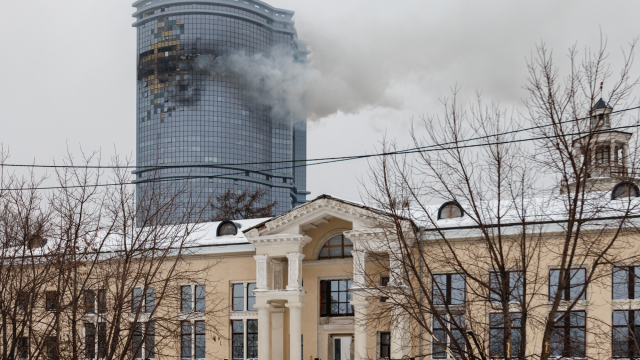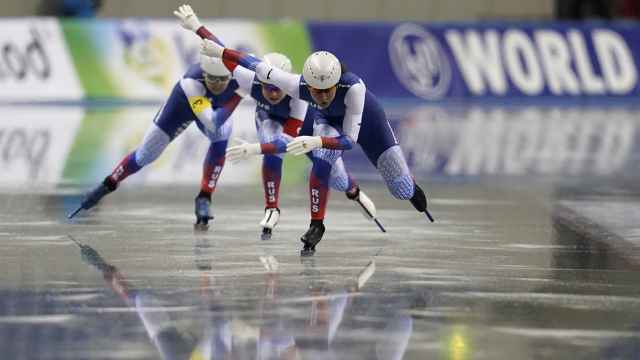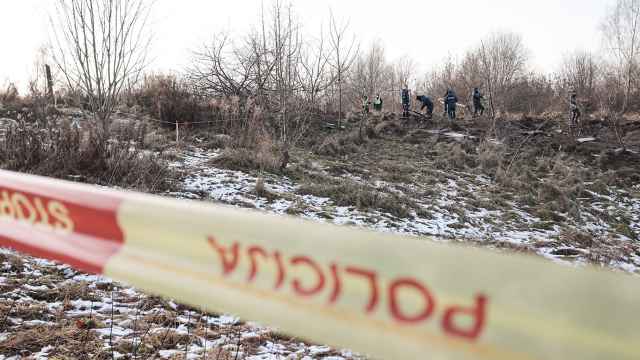Global warming in the next 40 years will allow Russian authorities to save on central heating, increase agricultural production and extend sea navigation in the north, a leading Russian climatologist told a Russian-German conference Wednesday.
But authorities will have to fork out money to reconstruct several big Siberian and Far Eastern cities to prevent them from collapsing as a result of a warmer climate, Vladimir Klimenko, head of Laboratory of Global Power Engineering Problems at the Moscow Power Engineering Institute told the conference co-organized by Alexander von Humbolt Foundation.
However, "the reduction of heating alone outweighs all the negative results [of the global warming] by many times," Klimenko said. If the money saved through reducing heating "is spent sensibly, then something can be achieved," he said.
Klimenko based his English-language report on the findings of his laboratory.
Climate was discussed elsewhere Tuesday. The World Meteorological Organization said during the annual UN Climate Change Conference in Cancun, Mexico, that scorching heat waves that killed thousands of people in Europe in 2003 and that choked Russia earlier this year were set to appear like an average summer in the future as the Earth continued to warm.
Klimenko said the heating season in central Russia will be two weeks shorter by 2050, which will allow Russian authorities to reduce energy consumption by 3 billion tons of oil by that time. The season will shorten further by 2150, which will save 17 billion tons of oil by then.
In agriculture, the duration of the growing season will increase and the land area potentially suitable for agricultural use will increase by 33 million hectares by 2050 and 46 million hectares by 2150.
The duration of ice cover along the Arctic shoreline will decrease, resulting in a longer navigation of 50 days by 2050 and 105 days by 2100.
Also, by the end of the century, the Barents and Pechora seas will be ice-free the whole year round and summer transpolar voyage will become possible.
Permafrost will considerably retreat within an area of 3.6 million square kilometers by 2050 and 5.6 million square kilometers by 2150, which will require authorities to replace many dilapidated buildings in such Siberian cities as Vorkuta, Chita and Magadan.
Andrei Shmakin, head of the Laboratory of Climatology at the Institute of Geography of the Russian Academy of Sciences, said in a telephone interview Wednesday that the global warming's impact on agriculture could be harmful in Russia's southern regions because of the threat of harvest-destructive droughts.
Shmakin also said navigation could become more dangerous because the global warming could increase the number of icebergs for several dozen years, which would also be potentially harmful for oil rigs.
Authorities can prevent dilapidated buildings from collapsing by driving pillars, on which the building's foundations rest, deeper into the permafrost, Shmakin said.
Another potential effect of the global warming will be heavier snowfalls in Siberia, which will be good for harvest but bad for driving on the roads, Shmakin said.
The average yearly temperature as a result of the global warming will rise in Russia by 2.5 degrees Celsius by 2050 and by 5 degrees by 2150, compared with the global rise by 1 and 2 degrees by respective years, Klimenko said.
A Message from The Moscow Times:
Dear readers,
We are facing unprecedented challenges. Russia's Prosecutor General's Office has designated The Moscow Times as an "undesirable" organization, criminalizing our work and putting our staff at risk of prosecution. This follows our earlier unjust labeling as a "foreign agent."
These actions are direct attempts to silence independent journalism in Russia. The authorities claim our work "discredits the decisions of the Russian leadership." We see things differently: we strive to provide accurate, unbiased reporting on Russia.
We, the journalists of The Moscow Times, refuse to be silenced. But to continue our work, we need your help.
Your support, no matter how small, makes a world of difference. If you can, please support us monthly starting from just $2. It's quick to set up, and every contribution makes a significant impact.
By supporting The Moscow Times, you're defending open, independent journalism in the face of repression. Thank you for standing with us.
Remind me later.






